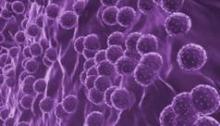A risk score derived from four simple test results readily obtained during routine care may help identify the patients with chronic hepatitis C who are most at risk for developing hepatocellular carcinoma, according to a retrospective study published online July 12 in the European Journal of Internal Medicine.
The score could enable physicians to target only the highest-risk patients for annual surveillance for malignant hepatic nodules, which is crucial because current screening methods are too invasive, too expensive, and too low-yield to be applied broadly across all risk groups.
The new risk score also may help identify patients with chronic hepatitis C who are at lowest risk for developing HCC, who can then be reassured that they can safely forgo invasive and expensive surveillance, reported Dr. Juan Carlos Gavilan and his associates at University Hospital Virgin de la Victoria, Malaga (Spain).
The investigators reviewed data from a 17-year longitudinal cohort study involving 829 patients with chronic hepatitis C. These subjects were assessed every 6 months for the development of HCC using serum alpha-fetoprotein (AFP) levels and ultrasound imaging to detect new focal hepatic lesions.
A total of 58 subjects (7%) developed HCC during follow-up.
An initial univariate analysis identified numerous clinical and epidemiologic factors associated with elevated risk for HCC. The researchers constructed a formula for predicting risk using the four independent factors that were most predictive of HCC in this cohort: patient age, platelet count, gamma-globulin level, and AFP level at baseline.
By dividing the study population into tertiles, Dr. Gavilan and his colleagues established cutoff ranges for low, medium, and high risk. They then classified each study participant as belonging to one of these three categories, to see how well this risk score correlated with the actual rates of HCC.
The annual incidence of HCC was 0.06% in the group designated as low risk, 0.5% in the group designated as medium risk, and 2.6% in the group designated as high risk, indicating that this "HCC-4 risk score" was indeed highly predictive, Dr. Gavilan and his associates said (Eur. J. Intern. Med. 2013 July 12 [doi: 10.1016/j.ejim.2013.06.010]).
In fact, the score was more accurate at predicting HCC than was the commonly used fibrosis index, they noted.
According to recently published recommendations, surveillance is only justified in populations with an HCC incidence of 1.5% or more per year. Thus, patients found to be high risk using this HCC-4 risk score would be appropriate for such surveillance, while those at medium or low risk would not be.
"These results must be confirmed in other studies," the investigators said.
There was no external funding source for this study, and no financial conflicts of interest were reported.


